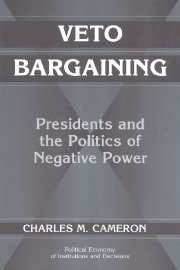Crossref Citations
This Book has been
cited by the following publications. This list is generated based on data provided by Crossref.
Cox, Gary W.
1999.
The Empirical Content of Rational Choice Theory.
Journal of Theoretical Politics,
Vol. 11,
Issue. 2,
p.
147.
Alt, James E.
and
Lowry, Robert C.
2000.
A Dynamic Model of State Budget Outcomes under Divided Partisan Government.
The Journal of Politics,
Vol. 62,
Issue. 4,
p.
1035.
Cameron, Charles
Lapinski, John S.
and
Riemann, Charles R.
2000.
Testing Formal Theories of Political Rhetoric.
The Journal of Politics,
Vol. 62,
Issue. 1,
p.
187.
Amorim Neto, Octavio
and
Magar, Eric
2000.
Veto Bargaining and Coalition Formation: A Theory of Presidential Policymaking with Application to Venezuela.
SSRN Electronic Journal,
Magar, Eric
2001.
Making Sound Out of Fury: Using Vetoes for Posturing in Chile and in Mexico.
SSRN Electronic Journal,
Rapkin, David P.
2001.
The United States, Japan, and the power to block: the APEC and AMF cases.
The Pacific Review,
Vol. 14,
Issue. 3,
p.
373.
Canes-Wrone, Brandice
2001.
A Theory of Presidents' Public Agenda Setting.
Journal of Theoretical Politics,
Vol. 13,
Issue. 2,
p.
183.
Magar, Eric
and
Weldon, Jeffrey A.
2001.
The Paradox of the Veto in Mexico (1917-1997).
SSRN Electronic Journal,
Qvortrup, Mads
2001.
The Danish euro referendum in comparative perspective.
Representation,
Vol. 38,
Issue. 1,
p.
77.
Conley, Richard S.
and
Kreppel, Amie
2001.
Toward a New Typology of Vetoes and Overrides.
Political Research Quarterly,
Vol. 54,
Issue. 4,
p.
831.
Conley, Richard S.
2002.
Presidential Influence and Minority Party Liaison on Veto Overrides.
American Politics Research,
Vol. 30,
Issue. 1,
p.
34.
Gilmour, John B.
2002.
Institutional and Individual Influences on the President's Veto.
The Journal of Politics,
Vol. 64,
Issue. 1,
p.
198.
Deen, Rebecca E.
and
Arnold, Laura W.
2002.
Assessing Effectiveness of Veto Threats in the Bush Administration (1989-1993): Preliminary Evidence from Case Studies.
Congress & the Presidency,
Vol. 29,
Issue. 1,
p.
47.
Setear, John K.
2002.
The President’s Rational Choice of a Treaty’s Preratification Pathway: Article II, Congressional‐Executive Agreement, or Executive Agreement?.
The Journal of Legal Studies,
Vol. 31,
Issue. S1,
p.
S5.
Chaisty, Paul
and
Schleiter, Petra
2002.
Productive but Not Valued: The Russian State Duma, 1994-2001.
Europe-Asia Studies,
Vol. 54,
Issue. 5,
p.
701.
Bowman, Ann O’ M.
and
Krause, George A.
2003.
Power Shift.
American Politics Research,
Vol. 31,
Issue. 3,
p.
301.
Hammond, Thomas H.
and
Butler, Christopher K.
2003.
Some Complex Answers to the Simple Question ‘Do Institutions Matter?’.
Journal of Theoretical Politics,
Vol. 15,
Issue. 2,
p.
145.
Di Paola, Stefania
2003.
International treaty‐making in the EU: What role for the European parliament?.
The International Spectator,
Vol. 38,
Issue. 2,
p.
75.
Lax, Jeffrey R.
2003.
Certiorari and Compliance in the Judicial Hierarchy.
Journal of Theoretical Politics,
Vol. 15,
Issue. 1,
p.
61.
Shipan, Charles R.
and
Shannon, Megan L.
2003.
Delaying Justice(s): A Duration Analysis of Supreme Court Confirmations.
American Journal of Political Science,
Vol. 47,
Issue. 4,
p.
654.



